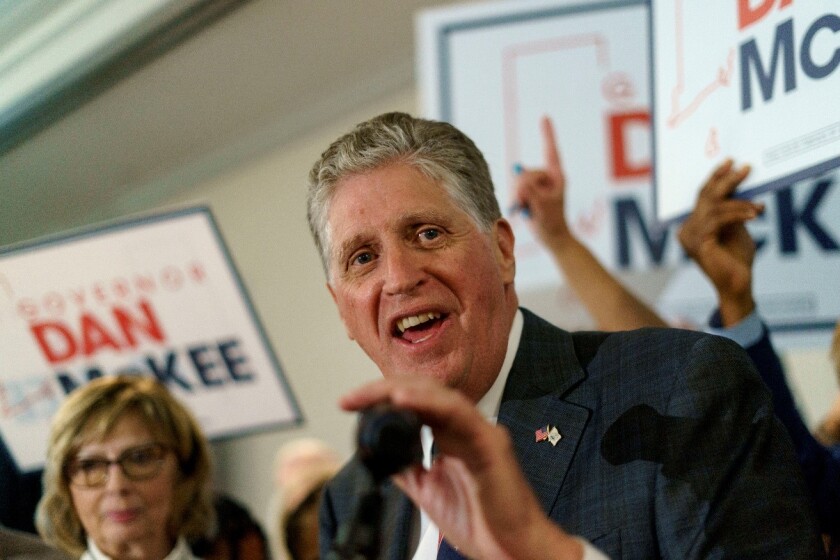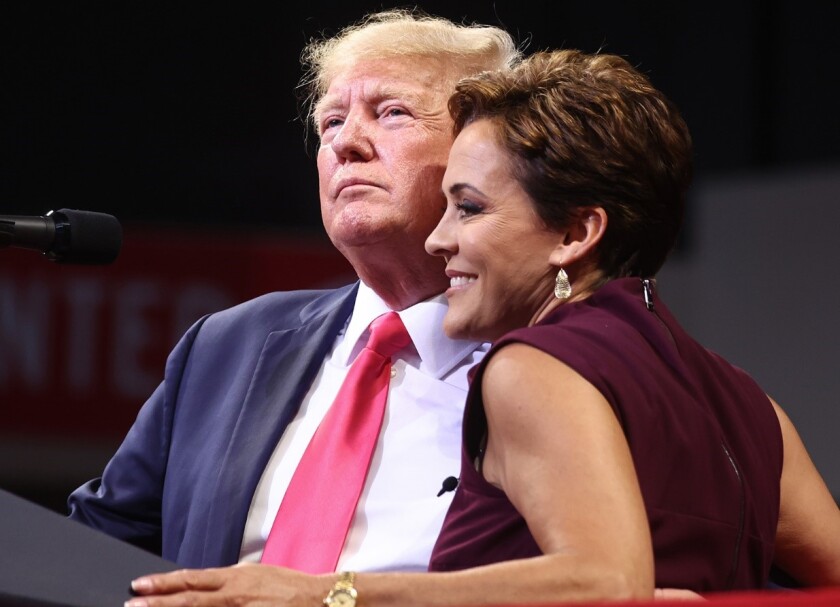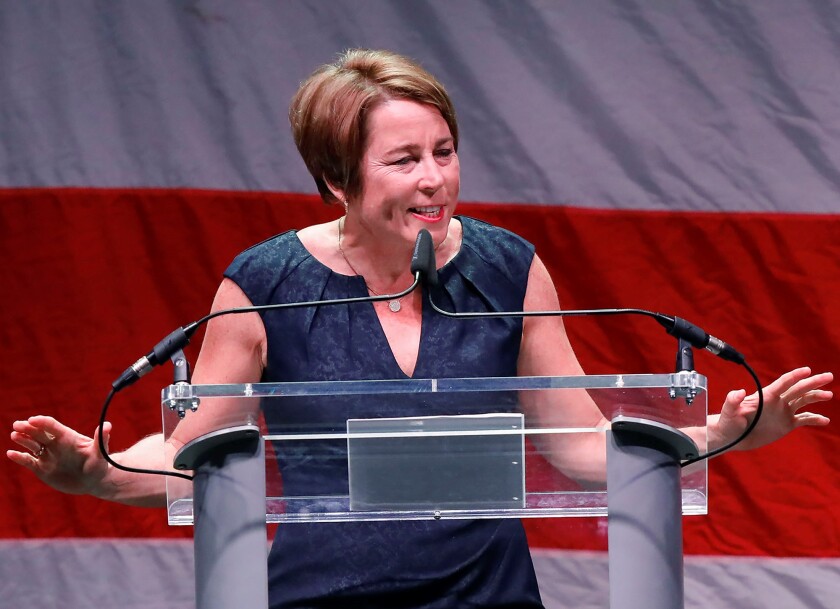Political Debates Are Going Out of Style: Katie Hobbs is the Democratic nominee for governor in Arizona. Once it became clear she will not debate her GOP opponent Kari Lake, the Republican Governors Association had some choice words for her. “Bawk, bawk, bawk…” RGA spokesman Will Reinert said in a news release.
Calling someone chicken might be enough to start a fight in seventh grade, but it’s not enough to convince a politician to debate. Around the country, numerous candidates for governor and other offices have decided that participating in debates is not in their own best interest. At this point, it looks like there won’t be any debates in Ohio’s governor race, or in the New York governor race, or Pennsylvania, or California, or … you get the idea. In some other states that have traditionally held three or more debates, such as Iowa and Wisconsin, this year there will only be one.
“Our proven strategy remains the same: meeting Nebraskans face to face, one handshake at a time,” said Kenny Zoeller, campaign manager for Jim Pillen, the GOP gubernatorial nominee, who’s not debating. “Jim is a livestock producer, not a politician, and he doesn’t do political theater.”
Saying you won’t do political theater is, of course, political theater. But why are so many candidates deciding they’re better off not debating? There are multiple explanations, but it basically comes down to the risk-reward ratio. Engaging in a high-stakes debate is a chance to make a mistake that will hurt your campaign. That’s what Terry McAuliffe, the losing Democrat in last year’s Virginia race, found out when he made an ill-phrased comment dismissing parental rights in education.
“Politicians don’t like debates unless they’re very talented at them, and even then they know it can be a risky business,” says Jacob Thompson, a communication professor and former debate coach at the University of Nevada, Las Vegas. “Even talented debaters can make a gaffe that can derail a campaign.”
Campaigns often fight about the setting, ground rules and formats of debates. In a time of polarization and complaints about media bias, Democrats might shy away from debates hosted by an affiliate of the conservative Sinclair Broadcast Group, for example, while Republicans might object to a public media outlet. Doug Mastriano, the GOP nominee for governor in Pennsylvania, called for a debate run by the campaigns themselves, with no media involved at all.
In some states, various media organizations, retired politicians, universities or good-government groups have banded together to form debate coalitions. In effect, they present politicians with take-it-or-leave-it options, keeping them from debating the terms of the debates themselves. Candidates don’t have to participate, of course, but the prospect of “empty chair” debates if they don’t show up amounts to handing their opponent an hour’s worth of free airtime.
For the most part, though, candidates only pay a small price for refusing to debate. Their opponent might try to make an issue out of it, and the editorial boards won’t be happy, but it almost certainly won’t sway any race’s outcome. “There’s really little price to be paid for skipping out on a debate,” says Larry Sabato, director of the University of Virginia Center for Politics. “Have you ever met a single person, recently, who said they’d base their vote on whether a debate took place? Of course not.”
If candidates don’t like debates — unless they’re behind and hope to gain a boost — and the public doesn’t care all that much, you can count on fewer and fewer debates in the future. Will anything be lost? Thompson, the UNLV professor, says citizens will end up less informed. With so much horse-race coverage and so little media exploration of respective issue positions, debates offer voters a rare chance to find out what candidates think about Medicaid or education or other pertinent matters. Not to mention being able to check out and compare the demeanors of those running.
“Debates are the only time when the vast, vast majority of potential voters have the chance to see candidates in unscripted venues,” Thompson says. “These are not just soundbite moments, otherwise candidates would not be afraid to do them.”

Mastriano’s not the only GOP nominee who’s gone silent. None of the Republican candidates for governor in Arizona, Illinois, Maryland, Massachusetts and Michigan have aired a single TV ad since winning their respective primaries, according to The New York Times.
This is an age of candidate-centered politics. Parties no longer handpick candidates and, in fact, many try to stay out of primary fights altogether. Being seen as the party favorite or establishment candidate is actually a hindrance in a lot of races.
Emerging out of nowhere has its price, however. Candidates who make their way up the ranks from lower offices get to know a party’s traditional donors and allies. Inexperienced candidates may have fresh appeal — particularly Republicans with endorsements from former President Donald Trump or star-making appearances on Fox News. Super PACs and other outside groups can pick up a lot of slack, but they don’t receive the discounted ad rates that candidates get and they aren’t guaranteed to amplify the same messages a candidate wants — or get involved in races at all.
There’s a reason money’s called the mother’s milk of politics. Being able to pay for enough advertising and campaign operations to let voters know you’re around, and why you’re the better choice, still matters. On Wednesday, UVA’s Center for Politics changed its ratings in both the Michigan and Pennsylvania governor’s races, saying it’s now “likely” that Democrats will win both.
Republicans Boost Legislative Candidates: For career politicians, moving from state capitols to Congress is a well-trodden path. Former state legislators consistently make up half the membership of Congress, according to the National Conference of State Legislatures. Now, Republican organizations are teaming up to ease this step up the ladder.
The National Republican Congressional Committee and the Republican State Leadership Committee have announced a joint “pipeline” project. The NRCC will run mentoring programs that will pair members of Congress with state lawmakers thinking of making the move to Washington, while the RSLC will provide funds in races to replace those legislators.
More than 100 Republican candidates for the U.S. House this year are current or former state legislators. “We are incredibly proud of how many state legislators are making that jump this cycle,” RSLC President Dee Duncan said in a statement, “and we are committed to ensuring Republicans continue to hold the line in the states by retaining these critical seats.”

“I approached the truck, and loudly called him by his name and stated that I had court documents for him. Mr. Paxton ignored me and kept heading for the truck,” process server Ernesto Martin Herrera, who’d waited outside the Paxton home for an hour, said in a sworn affidavit.
Paxton said he was concerned for his family’s safety. A federal district judge granted his request to have the subpoena quashed.
In Illinois, Gov. J.B. Pritzker called on two state senators to resign amidst legal troubles. State Sen. Emil Jones III has been charged with accepting bribes, while Michael Hastings has not been charged with a crime but is accused of abusing his wife. Earlier this year, the state paid $100,000 to settle complaints from Hastings’ former chief of staff about racial and gender discrimination.
Pritzker, Jones and Hastings are all Democrats.
"In the best interests of their constituents, these men must resign from their offices,” Pritzker said. “I want to send a clear message to the people of Illinois: Corruption and abuse have no place here.”
Previous Editions
-
This year's primary election season reached its conclusion in three Northeastern states on Tuesday and MAGA Republicans succeeded in New Hampshire. Meanwhile, state Supreme Court justices defend their own role and an intergovernmental feud heats up.
-
Democrats shouldn't count their chickens yet; what happens when election deniers run elections; and what the courts have to say.
-
The share of female governorships could exceed 20 percent this year, more women are registering and more incumbents are losing. There's also a revolution in the courts as states use unconstitutional maps.
-
Inside politics: Key governor contests are set with abortion as the central issue; a defense of state Senates puts the focus on Nebraska; and, once again, a big number of legislators are facing no competition in elections.













